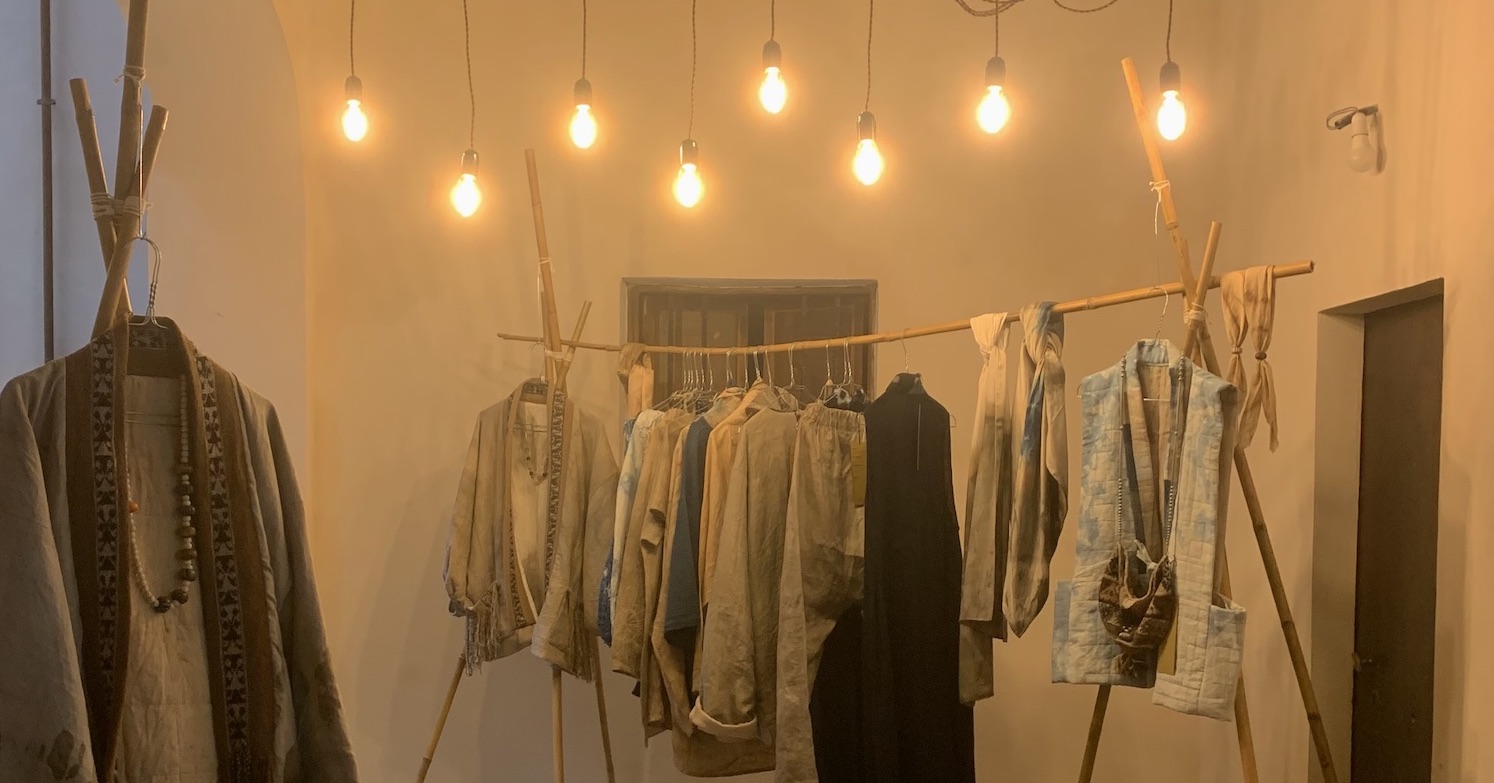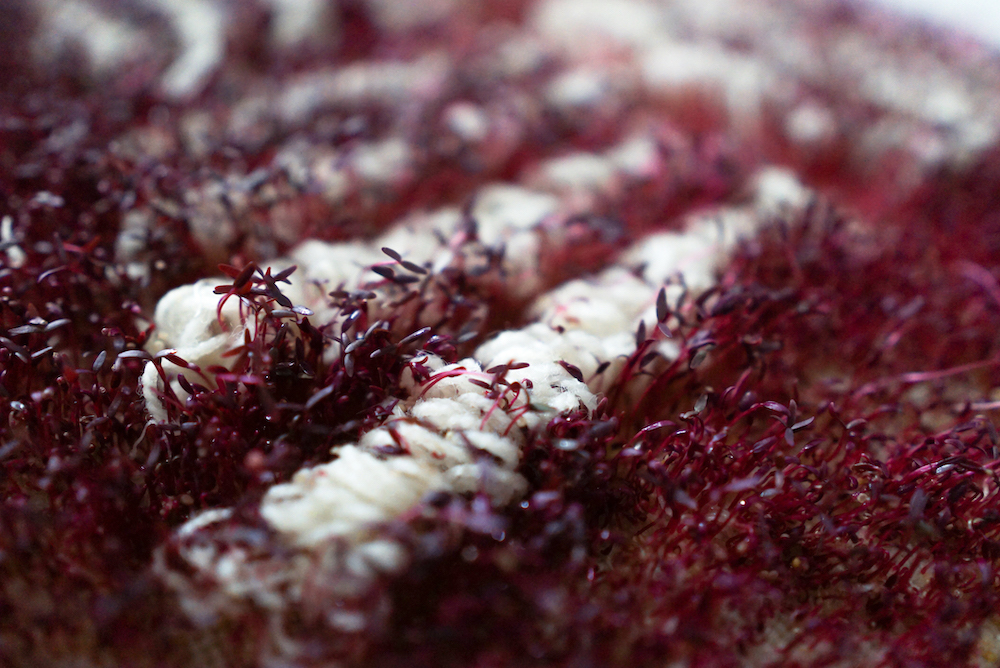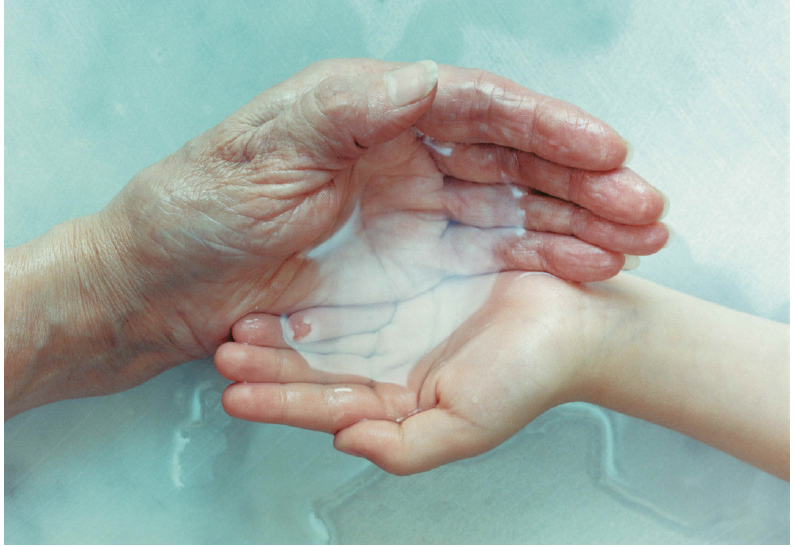From Greece to Mexico, Slovakia to India, the Xtant event in Palma de Mallorca (May 9-13) united inspiring brands that exemplify the beauty of artisanal and sustainable fashion. Each brand showcases unique craft traditions, innovative techniques, and a strong commitment to environmental and cultural preservation. Founded by Kavita Parmar, this curated showcase celebrates timeless craftsmanship while advocating for a future rooted in authenticity, community, and respect for nature. Let’s explore the stories behind seven of these visionary brands and their dedication to creating meaningful, handcrafted garments during this transformative event.
Belgrims (Greece)
Danae Grimopoulou is 31 years old and creates all her clothes by hand in Greece, primarily using recycled materials. She collaborates with women artisans in a rural village. “They are very powerful and skilled in various techniques, and I strive to combine my creativity with their craftsmanship, helping them see how these techniques can be translated into wearable garments.”
Danae values beauty, harmony, authenticity, truth, and positive energy. “Everything we make or do carries its own energy. In Greek, we use the word Meraki—a wonderful term that describes a state of mind where body and soul are connected. When you do something with Meraki, it is infused with high energy.”
Her production process is slow and deliberate. Some limited pieces are made to order, in the midst of nature, surrounded by mountains, with birds singing nearby.
Belgrims mainly uses cotton, linen, poplin cotton, and lace. It is a contemporary romantic brand that draws inspiration from the past, nostalgia, and femininity.
“Greek craftsmanship is very rich, and our culture and history are equally profound.”

Belgrims
Saoirse Byrne (California, USA)
Saoirse Byrne is a passionate craftsperson specializing in cordage and textile art. Since 2019, she has focused on creating jewelry from heirloom fabrics and textile waste, teaching others to repurpose sentimental and discarded materials. She holds a BFA from RISD and an MBA in Sustainable Business, and her work is showcased at the Museum of Craft and Design in San Francisco.
Residing near San Francisco for twenty years, she has a rich background in art, design, and custom garment making. Her interest in natural fibers began thirteen years ago at the Buckeye ancestral skills gathering, inspired by her great-grandmother’s handkerchief, which she transformed into cordage to honor family heritage. For Saoirse, cordage represents connection and continuity, and she is dedicated to sharing this timeless craft through teaching and creation to preserve tradition and community.
“I first learned about natural fibers when I decided to repurpose used clothing into necklaces that tell stories. I began creating pieces as a tribute to my great aunt and great uncle, using all the fabrics I had around—materials I wouldn’t typically wear, such as scarves and handkerchiefs. This inspired me to teach others how to create jewelry from textile remnants. Essentially, making a necklace involves taking two pieces of fiber and twisting them together.”

Saoirse Byrne
Vankar Vishram Valji (India)
Shamji Vankar Vishram proudly presents his brand of organic cotton and wool products, crafted using traditional techniques and natural indigo dyes.
“Our raw materials—cotton and wool—are cultivated locally in Gujarat and harvested exclusively during the rainy season, ensuring sustainable and eco-friendly practices. We specialize in creating elegant shawls, stoles, blankets, and furnishings, all dyed with plant-based indigo methods”, he says.
Through partnerships with Xtant, Shamji Bhai has established strong connections across Europe, including Mallorca, enhancing our reach to international markets.
Shamji Bhai is an innovative weaver and an early adopter of Kala Cotton. He personally oversees Vankar Vishram Valji Weaving, a multigenerational craft initiative dedicated to weaving and dyeing high-quality fabrics.
“Our work involves around 90 local families, preserving traditional techniques while providing sustainable livelihoods.”
Over the past 20 years, Shamji Bhai has transformed this endeavor into a thriving business recognized for its craftsmanship and quality, serving both local and international clients.
His dedication to preserving and innovating traditional weaving has earned him recognition as a master craftsman, including the prestigious UNESCO Seal of Excellence.

Vankar Vishram
Maison Šipulová (Slovakia)
Kristína Šipulová has launched her fashion brand in Slovakia.
“We create timeless pieces. These garments are more like interiors for your body; they support and nurture you. Through textile, you can get to know yourself better by wearing them. This means the garments facilitate better communication with yourself. For example, when you wear a jacket made from 100% hemp, it carries the message of nature with you. We choose hemp because it can regenerate soil and requires minimal water to grow. For me, it’s essential to give back to nature—what comes from nature should return to it.”
She has a background in textiles, and her philosophy involves creating accessories from natural materials like corn husks, such as bags and shoes. The brand has three lines: the first features haute couture pieces; the second consists of vintage textiles; and the third offers high-quality, everyday garments. “We often mix pieces from different lines to create unique combinations.”

Sipulova
TuYo Foundation (Mexico)
Founded by Inês Queirós and Gabina Valentin López, TuYo Foundation aims to restore traditional artisanal production, develop rural areas, and implement community-based sustainable projects.
Inês is Portuguese, trained in landscape architecture and textile art in the Netherlands. She has lived in several countries and has been residing in Mexico for the past 10 years. She founded TuYo Foundation with the goal of protecting Mexico’s indigenous communities and their ancestral textile knowledge.
Currently, she is working on a project in the state of Guerrero, Mexico, together with Gabina, to support their community.
“I am originally from the state of Guerrero. As a child, I learned textile arts from my mother and sisters. I want to preserve what my ancestors did, and now Inês is helping me open doors and promote our craftsmanship”, says Gabina.
The dresses are made from natural cotton in three colors: green, white, and coyuchi (brown). They feature hand embroidery that depicts fruits and flowers from the rural environment.
At the moment, the non-profit organization does not receive any funding, so it relies on selling dresses and offering workshops to teach their craft.

TuYo Foundation
RaasLeela (India)
Hetal Shrivastav is a weaver, a creative individual, and the founder of RaasLeela Textile.
Hailing from a weaver’s community, Hetal has dedicated decades to Gujarat’s needle craft.
RaasLeela produces 100% hand-sewn items, utilizing traditional embroidery techniques without ever relying on sewing machines.
Committed to sustainability, RaasLeela operates a zero-waste studio by upcycling all fabric scraps into surface materials, avoiding chemical dyes and bleach that cause pollution. The studio’s design philosophy celebrates the irregularities and imperfections inherent in handmade products, emphasizing non-uniformity as a core element—each piece is uniquely one of a kind.
RaasLeela advocates for artisans’ involvement in the design process, fostering a genuine connection between artisans and their work. This approach aims to transform labor into a dynamic and creative pursuit, moving beyond mere routine or adherence to standard procedures.

RaasLeela
Mía (Spain)
Maria Azcárate is the founder of the regenerative fashion brand Mía.
Originally from the Canary Islands, she studied design in Madrid and completed her internship with Kavita Parmar, founder of Xtant and The IOU Project—a traceability platform that, since 2010, has enabled customers to connect with the artisans who worked on the designs and fabrics of their clothing.
“It was incredible to understand fashion from another perspective. It resonated deeply with me.”
In Tenerife, with her partner, Mía has a showroom and a workshop where they handle the production process (design, pattern making, sewing). They also work with natural dyes, using Cutch (kuchinilla) for dyeing and they source their fabrics from abroad with GOTS certification.
“Our focus is to create 100% biodegradable clothing—everything is natural, from the materials to the process itself. We aim not only to have zero impact on the planet but also to nourish the land where the garments will eventually end their life.”

Mía
“Meanwhile, my partner, who studied finance, realized that the economy originates from the ground—it’s the root of everything—and became a farmer. We are not currently growing our own cotton, but we hope to do so in the future. For now, we implement an agroforestry system. During production, we reuse fabric scraps as compost to enrich the soil and support our agroforestry practices.”
Additionally, María provides her customers with a card that, upon purchasing their fifth item, allows them to plant a tree at home.
“We believe in fostering a sense of community because this work must be done collectively.”
Photos & Words : Anne-Sophie Castro
More information on ethical and sustainable fashion in our magazine




